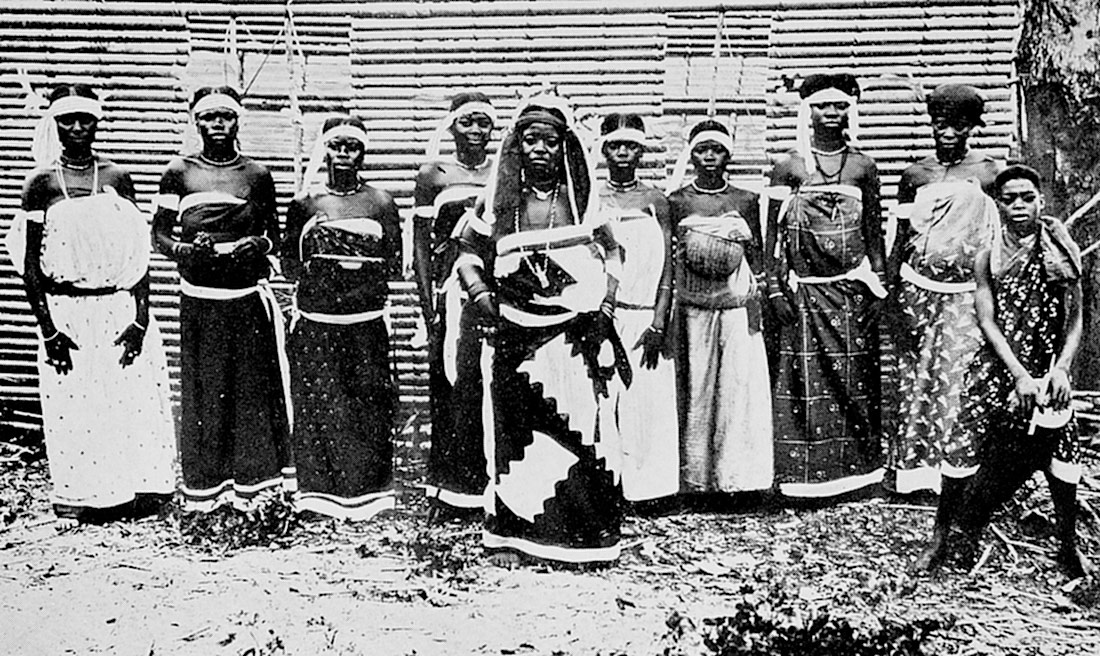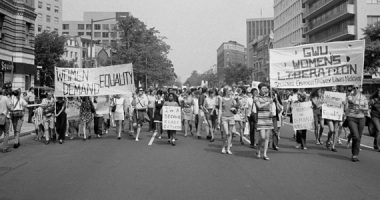
Women’s secret society of Gabon, 1912 | The New York Public Library Digital Collections | Public Domain
Across the entire African continent, there are actions developing in which women who have suffered sexual violence are using the social media networks to denounce their aggressors. This is not a matter of revenge but of seeking justice. Let’s remember that the institutions continue to be sexist; that the stigma of rape lies with the victims and not the perpetrators; that the latter enjoy impunity while survivors suffer rejection; and that the authorities are failing to act. But on the social media networks… on the social media networks they find a last round to fire, to reaffirm themselves, to resist, to demand reparation and to provoke a change.
They lost their trust in institutions a long time ago, but women from various African countries are increasingly finding, in the social media networks, a last safe refuge where they can stand up to sexual violence. Formal structures, from the police to the courts, and passing through the parliaments where the laws are passed, are impregnated with a gender-based discrimination that is asphyxiating the key social environments. That is the analysis that has led broad sectors of the female population in many countries in sub-Saharan Africa to conclude that the authorities will not protect them against sexual violence. However, they are not willing to resign themselves to the status of victims, and in the digital environment they have found a space in which to deploy strategies for mutual support, for breaking with taboos and for demanding justice. From Senegal to South Sudan, from Nigeria to Uganda, digital actions are developing that not only aim to inform or raise awareness, but they are denouncing and calling out aggressors, filling in the gaps left by conventional police, court, and legislative structures.
We are not talking about an isolated episode. The triggers have been varied. The sparks start to fly in the most unsuspected form. But the fact is that, in recent months (in some cases, years), actions have arisen in which the networks have become a place for the public denunciation of sexual aggressors in different African countries. Each action presents its own specific dynamics and all of them develop autonomously, but the accumulation evidences a more widespread phenomenon, in which many of those communities are trying to break down the social barriers to denouncing, putting an end to the stigma of those who have suffered that violence and forcing a debate and a reflection that unleashes a change in mentality. Having dispelled the myth that a movement like #MeToo was really global, and beyond the navel-gazing that is represented by thinking that what happens in the North occupies the centre, the pace of these mobilisations shows that each community has its own particular conditions, and that the demands for transformation should respond to these conditions.
“I will not shut up” was the slogan of a group of Senegalese women activists, this is the translation of the hashtag #nopiwouma which they launched in November 2017 with the express aim of generating a space in which to “free tongues and support each other mutually”. Its promoters have tried to provide a mechanism so that other women can denounce their experiences while maintaining their anonymity. Some have done so during this time and #nopiwouma continues being a reference point for a radical denouncement of sexual violence in the country.
The foundations of the universities of Western Africa were shaken to the core as a consequence of #SexForGrades. In October 2019, the BBC broadcast an investigative report in which it denounced the cases of university lecturers in Ghana and Nigeria who demanded sex in exchange for good grades for their female students. Sex for Grades was the title of the programme and the hashtag used on social networks to disseminate the broadcast, but immediately #SexForGrades became independent and the conversation on Twitter contained a tough debate. Beyond the specific cases denounced in the documentary, many female users of social media networks saw an opportunity to share their experiences and, in some cases, to call out other university lecturers who had abused their position in order to force their students.
The direct reactions to the broadcast combined with the publication of traumatic experiences in university offices but, in any case, they also involved popular users who increased the impact of the message as well as politicians who, faced with the avalanche on the networks, had to define their own positions. Even the famous Nigerian author, Lola Shoneyin, shared the fact that she had suffered an episode of sexual aggression. In addition to explicitly exposing other lecturers, the conversation also served to propose measures that would make it possible to put a stop to a dynamics of abuse that everyone recognised as very widespread.
The reactions of the institutions regarding the lecturers exposed in the report were immediate, but at the same time, the conversation generated online accelerated some proceedings already open on abuses in the university sphere, and favoured the authorities making decisions regarding other lecturers who were accused. The wave gradually spread, to the point of spilling over and affecting people thousands of miles away. The backlash from the debate and the actions on the social media networks reached as far as Zambia, although with less intensity.
The consequences of the public denouncements were experienced, for example, in Uganda, but, far from discouraging users on the social media networks, the court actions against one of the women amplified the denunciations against the sexual aggressors. On 20 February of this year, Sheena Ahumuza Bagaine, a young Ugandan feminist activist, was arrested and accused of cyber-harassment. This was the result of her being reported to police by a man whom she had called out as a sexual aggressor on Twitter just over six weeks earlier.
At the start of the year, this young activist was having a conversation via social media networks with some of her friends when one of them confessed that she had suffered sexual abuse. Other users wanted to find out the identity of the aggressor to denounce him publicly and warn other women. Sheena Ahumuza Bagaine published the man’s name, convinced that she was protecting others from a predator. The conversation continued and, although it had not been her intention, this young activist started receiving the testimony of other users who had suffered sexual violence. She was so impacted by all of these messages that two days later she published a thread with the screen captures that exposed the alleged aggressors, while preserving the identity of their denouncers. One of the men applied judicial pressure on the activist, but came up against her refusal to eliminate the message where his name was mentioned as allegedly responsible for an aggression.
When Sheena Ahumuza Bagaine published the screen captures of the messages that she had received, many other Ugandan women users joined in the public denunciation of the men who had forced, harassed, or assaulted them. After the arrest of the activist, the campaign #FreeSheena was developed, to protest against the categorical nature of the police actions against the complainants, much more forceful than that used against the aggressors; they also criticised that the public denunciations were a reaction to the ineffectiveness of the justice system, and that sexual violence continues increasing in the country, such that women have to find a way of protecting themselves. Sheena was released on bail the following day, but the echoes of the demands continued to resonate.
The women of South Sudan have also highlighted their status as survivors in the face of sexual violence. They have done this in a recent action, #SouthSudaneseSurvivor, in which they alerted about the climate of hostility being faced by the country’s women and the impunity with which the aggressors live; they considered that the time had arrived to call them out, with names and surnames.
In this case, the trigger could almost be considered to have emerged by chance. Guye Furula, a young South Sudanese woman resident in the United States, explained in a podcast that eight years earlier she had suffered a rape at a party and she told how the experience, and the reaction of the people around her, had changed her life. It was not even the first time that this young woman had shared her experience. She had done it previously via YouTube. But this time, on 15 June of this year, Furula started to receive messages of support and admiration for her bravery. But she also started to receive testimonies from other South Sudanese women, who had suffered similar experiences.
This young woman’s message acted like a snowball, and the stories multiplied on the social media networks. The breaking down of the wall of silence in which these women played a central role was especially daring in a society with a heavy charge of discrimination deeply rooted in its structures. Those exposed were uncles, cousins, friends of the family, teachers, and bosses, often men who were very close to the victims which, partly, explained the social pressure borne by the women who suffer that violence and the perversion that surrounds the idea of family honour. To break through all of these boundaries, these women have preferred to prioritise their status as survivors over that of victims.
The distrust regarding public judgement weighs heavy on actions in which women who have suffered sexual violence talk about their experiences and expose their perpetrators openly. But for these women from different African countries who are increasingly finding in social media networks a hint of the protection that is not provided to them by the institutions, it is a question of survival, rather than one of image or of conventions. The well-known Ugandan journalist and activist Rosebell Kagumire offers a reminder: “The system continues to be sexist and it harasses survivors. What should really be questioned are these social ills related with sexual violence, the stigma surrounding rape and why the digital space seems to be the last safe refuge for women”.





Leave a comment